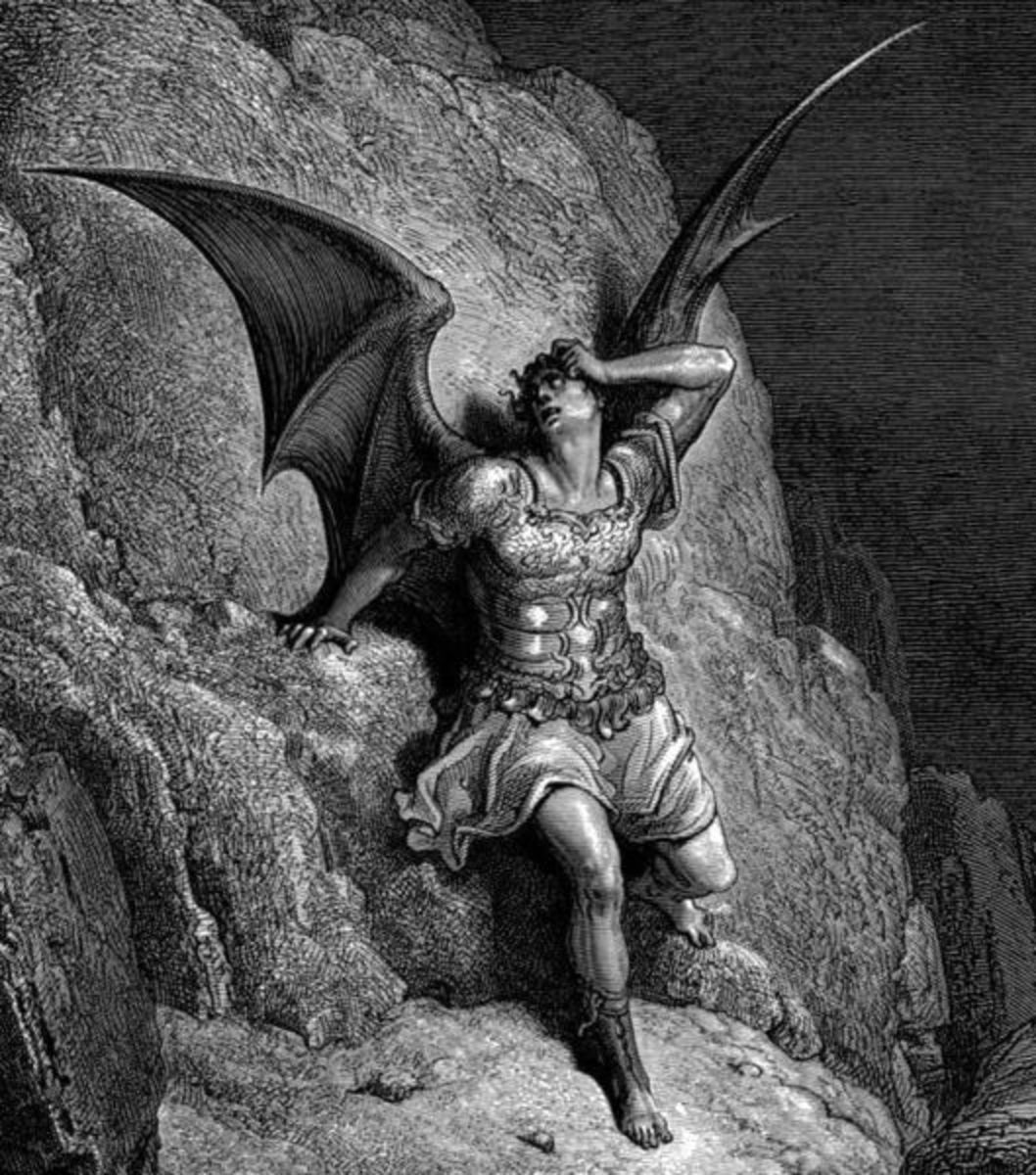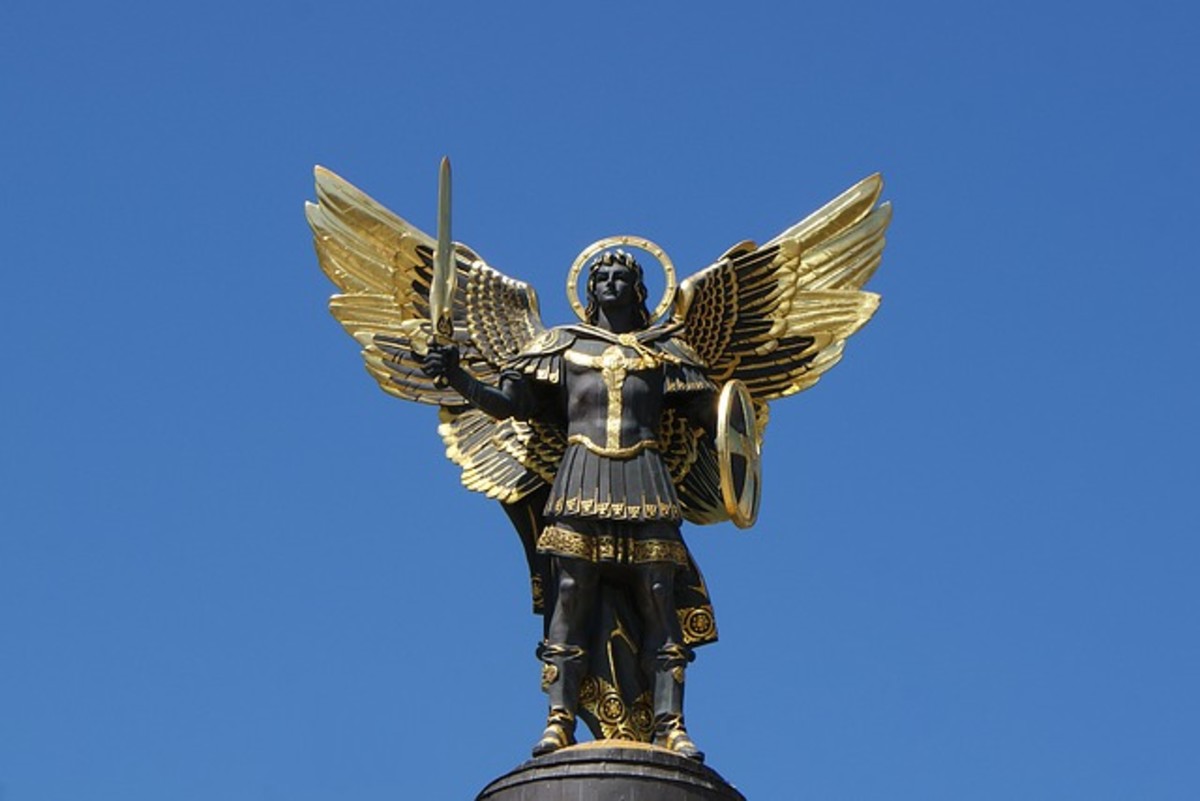Angels: God's Supernatural Servants

Introduction: The Existence of Angels
In this high-tech world in which we live, many have chosen to deny the existence of a supernatural world, and certainly the existence of angels. Yet this is arrogance to the extreme to assume that there simply can't be anything outside of what we know as the physical world. We live in a vast universe, and though our knowledge is growing, there is still so much that we don't understand about what we can measure and see. So it is foolish to think that a world beyond the physical realm is impossible.
The Bible assumes the existence of the supernatural world. It assumes the existence of God and angels, and demons, or fallen angels. In fact, it speaks extensively about these beings. The Old Testament talks about angels just over 100 times. And the New Testament mentions them 165 times.
And just what do these creatures look like? Angels are spirit beings (Hebrews 1:14), so they don't have any essential physical form. But angels do have the ability to appear in human form. When angels appeared to humans in the Bible, they were depicted as resembling normal males. In Genesis 18:1-19, God and two angels appeared as men and ate a meal with Abraham. Angels appear as men many times throughout the Bible (Joshua 5:13-14; Mark 16:5), and they never appear in the likeness of women, despite the modern depictions that we often see today.
Other times, these beings do not appear as humans at all but as otherworldly creatures that frighten the people who view them. Quite often, the first words out of an angel's mouth when talking to humans are: "Do not be afraid!"
These beings are truly fascinating creations of Almighty God and play a vital role in biblical history. So, we should take some time to look at what the Bible has to say about them.
In order to do that, it is important to realize that the truth about angels is not confined to a specific period of history or just to a few writers of Scripture. No less than 34 books of the Bible speak of them, from the earliest books like Genesis and Job, to the very last book, Revelation.
I. The Creation of Angels
Modern culture today has influenced the understanding many people have about angels. For example, it is a popular myth that, when people die, they become angels. The fact is, they are a separate creation from humans, and we will never become angels, and they will never be human beings.
Now let's take a moment to see where they come from and find out a little about their nature.
Although it is not explicitly stated in Scripture that angels were created, and none are mentioned in the creation account of Genesis 1 and 2, the fact that they were created is implied. Psalm 148:1-5 tells us:
"Praise the Lord! Praise Him in the heights! Praise Him, all His angels; Praise Him all His Hosts! Praise Him, sun and moon; Praise Him, all you stars of light! Praise Him, you heaven of heavens, And you waters above the heavens. Let them praise the name of the Lord, For He commanded and they were created."
Also, if we look at Colossians 1:16, Paul says:
"For in Him (Christ), all things were created, in heaven and on earth, visible and invisible, whether thrones or dominions or principalities or authorities-all things were created through Him and for Him."
Some scholars believe that Genesis 2:1, which talks about the completion of the heavens and the earth, and all the host of them, is a reference to the creation of the angels. And they would add Job 38:7 to that as well, where it speaks of the morning stars singing together and the sons of God shouting for joy, witnessing the creation. But there simply isn't enough evidence in either of these passages to prove this. In fact, Job 38:7 seems to indicate that they were already created before this time.
It would appear that the angels were all created at the same time, since they don't have the power to reproduce themselves (Matthew 22:30). Also, we are told of no new direct creations of God after the creation account in Genesis.
II. The Old Testament and Angels
The Old Testament sees angels as real beings that do the service of God. The Hebrew word for these creatures literally means 'messengers', as does the Greek word in the New Testament. Examples of Old Testament references include Abraham conversing and eating with angels in Genesis 18. And If you look in the life of David, you see an instance where an angel executed judgement on Israel when David wrongly took a census of the people (II Samuel 24:16). In the book of Isaiah, Isaiah's vision of the Lord included seeing the Seraphim. (Isaiah 6). Ezekiel saw the Cherubim (10:1-3). Daniel talks about the angels Gabriel and Michael in his book (9:20-27; 10:13; 12:1). Zechariah sees angels as agents of God and interpreters of visions (1-6). Throughout the Psalms, angels are seen as God's servants who both worship the Lord and keep His people from harm (Psalm 34:7; 91:11 and 103:20).
III. The New Testament and Angels
It is interesting that angels played, and will play a very important role in the ministry of our Lord Jesus Christ. They ministered at His birth, during His life, at the resurrection, at His ascension, and they will play a prominent role in his return. (Matthew 2:19; Matthew 24:27-31; Mark 1:13; Luke 2:13; John 20:12; and Acts 1:10,11).
The book of Acts has several references to angels helping out the servants of God. They opened prison doors for the Apostles (5:19 and 12:5-11). These heavenly messengers directed people in their ministry. They did this for Philip and Cornelius (8:26; 10:1-7). Also, we see an angel encouraging Paul during a storm on his voyage to Rome in Acts 27:23-25.
Paul, Peter, the writer of Hebrews, and Jude, in their writings, assume the existence of angels, and the book of Revelation contains 65 references to them. That is more than any other book in the Bible. And of course our Lord Himself talks about them (Matthew 13:36-43). To deny their existence is to call the teaching of Jesus Himself into question.
There is no denying that the Bible clearly teaches the existence of the powerful beings called angels. And it is comforting to know that these beings, in their service to God, help us in our lives as we live here on this earth (Hebrews 1:14). Our God is an awesome creator. And His creation includes these marvelous creatures that, though invisible to you and me, are no less real.
IV. The Nature of Angels
Next, let's look a little at the nature of angels.
1. They have Personality
First of all, they have personality. These beings are not mere automatons. They can express emotions, such as praising God. They can exercise their will, as with Satan, when he stated that he would be like the Most High. Also, Satan, like all of the other fallen angels, will be held accountable for these actions since they will be condemned for this in the future (Matthew 25:41). And of course, we can see from Scripture various places where angels are carrying on intelligent conversation with human beings. For example, an angel of the Lord appeared to Joseph in Matthew 1:20-21 to tell him not to be afraid to take Mary as his wife. Here is that exchange. It says:
"But while he thought on these things, behold, the angel of the Lord appeared unto him in a dream, saying: 'Joseph, you son of David, fear not to take unto you Mary your wife: for that which is conceived in her is of the Holy Ghost."
These verses, and the others, are all evidence of the personality of the heavenly angels.
2. They are Spirits
Next, we see that they are spirits. In Psalm 104:4, the Scripture says that the Lord "makes His angels spirits..." Also, the writer of Hebrews says of them:
"Are they not all ministering spirits sent forth for those who will inherit salvation" (Hebrews 1:14).
Our Lord said to his followers when talking about himself after the resurrection:
"A spirit does not have flesh and bones as you see me have" (Luke 24:39).
From this, it can be inferred that the angels don't have the types of physical bodies that we have. They are spiritual and normally unseen to the human eye.
Some theologians would go so far as to say that, being spirit, they cannot possess any body at all. However, some Scriptures teach otherwise. For instance, the cherubim, which are a class of angels, are carefully described in Ezekiel 1:5-24. It says they have faces, wings, hands, feet, and the appearance of a flashing light.
The seraphim are another class of angels. Isaiah 6:2 also describes them as having bodily parts. Hebrews 13:2 speaks of some people having entertained angels unawares. At least in this instance, they were not distinguishable from man in their appearance, although granted, they may have taken on human form temporarily.
As for wings, angels are sometimes described as having them. That doesn't mean that they all are winged creatures. But at least some classes of angels appear in this way. The images of cherubim on the ark of the covenant, for example, had wings that covered the mercy seat (Exodus 25:20).
Isaiah saw winged seraphim in his vision of the throne of heaven, each one having six wings (Isaiah 6:2). Ezekiel, too, saw visions of winged “living creatures,” which we take to be angels (Ezekiel 1).
Isaiah 6:1-2 also depicts angels having human features, including voices, faces, and feet. Angel voices are heard singing and praising God in several other passages. The angel at Jesus’ tomb is described as having a brilliant appearance: “His countenance was like lightning, and his raiment white as snow” (Matthew 28:3).
An interesting incident in Scripture is found in II Kings 6. Elisha the prophet prayed that his servant's eyes be opened to see the hosts of the Lord. And the young man's eyes were indeed opened so that he saw a mountain full of horses and chariots of fire around Elisha.
There is no doubt that angels are spirit beings, but from the above facts, it is hard to state that they have no bodies of any kind. It would seem that when the human eye is opened to the spirit world, these beings, normally invisible to the human eye, can become visible. We can conclude that, while they don't have physical bodies, they nonetheless have real bodies of a different nature than our own.
3. They Possess Superhuman Power
Scripture also indicates that the angels possess superhuman power. Man was made a little lower than the angels (Hebrews 2:7). If we look at II Peter 2:11, it says that angels are greater in power and might than men. In II Thessalonians 1:7, the Apostle Paul speaks of our Lord as one day coming with His mighty angels. Christ, in His incarnation, was made, temporarily, a little lower than the angels. This points out the superiority of angels over humanity. These creatures indeed are quite powerful beings.
4. They are Sexless
Also, as we alluded to earlier, contrary to modern depictions, angels aren't good-looking women with wings. Angels are sexless but always appear in Scripture as males. The fact that they are sexless is evident from the fact that they neither marry nor are given in marriage (Matthew 22:30). It is also understood from the fact that there is no sexual reproduction among them. There is no need for this since they are immortal. They don't die. We see this in Luke 20:35-36, which states:
"But they which shall be accounted worthy to obtain that world, and the resurrection from the dead, neither marry, nor are given in marriage: Neither can they die any more: for they are equal unto the angels; and are the children of God being the children of the reusrrection."
5. They were Originally All Holy
Finally, though the Bible gives little specific evidence about the original state of the angels, we know that when God finished His work of creation, He pronounced everything good (Genesis 1:31). So, we can infer from this that the original state of the angels was holiness. Jude 6 also indicates that angels were originally holy creatures. Some were elect (I Timothy 5:21) and others sinned (II Peter 2:4). Further, a holy God cannot create that which is unholy and sinful. Like men, it was their rebellion and sin that made some angels evil and subject to the judgment of the Lord.
We have merely scratched the surface of what the Bible has to say about the nature of angels. But suffice it to say for now that these creatures are unlike what you see on TV and in the movies. They are a wonderful creation of Almighty God that play an important part in His eternal plans for God's people and His universe.
V. The Number and Organization of the Angels
Another thing that we conclude as we study the angels is that we must acknowledge that they are a highly organized and intelligent creation of Almighty God. I do not doubt that if God were to open our eyes to see these beings, it would astound us at their number and the role they play in this universe.
1. Their Number
Although we really don't know how many angels there actually are, from Scripture, it can be understood that there are great multitudes. Hebrews 12:22 and Revelation 5:11 both indicate this. The book of Revelation says:
"Then I looked, and I heard the voice of many angels around the throne and the living creatures and the elders; and the number of them was myriads of myriads and thousands of thousands..."
The wording here is used to indicate a number beyond calculation. The Greek expression can also be translated "innumerable" or "many thousands." So it is safe to say that the amount is huge.
2. Their Organization
Further, it would stand to reason that within these huge numbers, there is much order and organization. That is true in all of His universe. And it certainly is true of angels. For instance, the Bible designates Michael as the Archangel, or chief of angels. (Jude 9; I Thessalonians 4:16). Daniel 10:13 indicates that he is one of several high-ranking angels, although he is the only one called the Archangel. Daniel calls them "chief princes."
In Paul's epistles, we see the angels referred to with governmental classifications. Seven times he calls them rulers or principalities. These designations are used of both the good and the evil angels governing the universe. (Romans 8:38; Ephesians 1:21; 3:10; 6:12; Colossians 1:16; 2:10,15).
They are called authorities or powers because of their superhuman authority in relation to the world. The demons are called the world rulers of this darkness in Ephesians 6:12. And Paul refers to the angels as thrones or dominions. This shows their dignity and authority in the rule that God has given them in His government (Ephesians 1:21; Colossians 1:16). We see Peter and Jude speak of them in this way as well in II Peter 2:10 and Jude 8.
The Cherubim are another order or classification of angels found in the Bible. It would appear that they are of very high rank since Satan was a Cherub before he fell (Ezekiel 28:14,16). Their job is to be the guardians of the holiness of God. They guarded the way to the tree of life in the Garden of Eden. (Genesis 3:24).
The Seraphim are an order of angels similar to the Cherubim. We see them in Isaiah 6 as attendants at the throne of God and agents of cleansing, such as when they cleansed the lips of Isaiah. The prophet gives us a description of them as six-winged human-like figures.
Gabriel is an angel of high rank, though not designated the Archangel. His name means "hero of God." In Scripture, his function was to bring important messages from God to key individuals. He did this to Daniel (8:16; 9:21), to Zacharias (Luke 1:19), and to Mary (Luke 1:26).
Conclusion
As we wrap this article up, it is important to realize that we haven't covered a very important part of our study when it comes to this supernatural subject. That is the work, or the role of angels in God's plan. This is such a big subject that I will need to write another whole article on it. But suffice it to say that these magnificent creatures, created by God, show us, in a greater way, what a mighty God we serve. For it is he who has made their existence possible.
Angels are spiritual beings, created by God to serve Him. The Bible tells us that the holy angels constantly carry out God's will. And we can learn a lot from these beings. For we, too, have been created to serve the Lord with our lives, just as they do.
And we have so much more reason to do so. For none of the angels know what it is like to be created in the image of their creator, like we have been. And no fallen angel knows what it means to be loved by God so much, despite their sinful nature. God cared for us so much that he was willing to send his Son to die for our sins. He never did that for angels.
We are so blessed to be Sons and daughters of the living God through faith in Jesus Christ. May we never forget the unique privilege we have, but spend eternity bowing before our great God and crying, like the angels before God's throne:
Holy, holy, holy, is the Lord of hosts. The whole earth is full of his glory! (Isaiah 6:3).
And then may we live a life that is worthy of that holiness. Indeed, the angels have it right. Now let's follow their example and make our lives match the endless devotion to the Lord that they have, giving glory to God forever.
© 2011 Jeff Shirley








